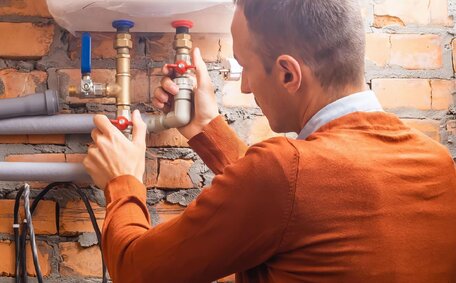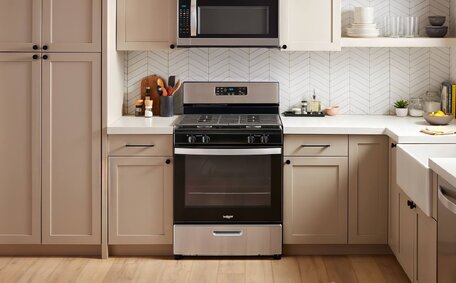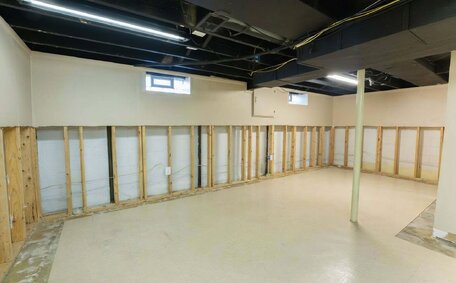Introduction to blocked drains
Common plumbing issues like blocked drains can cause inconvenient, costly, and potentially hazardous problems in homes and businesses. Materials like hair, grease, and tree roots can accumulate over time and obstruct water flow through your drain pipes.
Many might think they understand the causes of and solutions for blocked drains, but common plumbing myths persist, leading to improper maintenance practices or misguided do-it-yourself attempts to clear the blockage. As seasoned professionals, we endeavour to furnish residents with need know about drain upkeep to foster pipes’ wellbeing and thwart blocked drains in Ashfield and Sydney.
In the following segments, we dispel some of the most common misconceptions when comes to your water flow and the factors leading to blocked drain dilemmas. We’ll explain why commonly flushed items like wipes and grease actually harm your plumbing systems when they go down drain, sharing tips to prevent these issues.
Should you ever face a sudden, problematic blockage in your home or workplace, we also offer practical guidance on initial troubleshooting steps to take while you wait for a plumber.
Common myths about what causes blocked drains
It’s essential for homeowners and business operators to stop adhering to myths over facts when attempting to get to the bottom of some most common causes of blocked drains. Some most pervasive false beliefs can result in incorrect utilisation of plumbing systems or DIY fixes that worsen the issues.
There’s a common misconception that pouring grease down the kitchen sink is harmless, yet it’s just as damaging as incorrect disposal approaches like flushing baby wipes or discarding ice cubes into your toilet.
While these actions may appear harmless, the gradual accumulation of debris was very obstructive, significantly hindering the efficient water flow. Over time, substantial blockages can form and result in severe backups or pipe corrosion.
To dodge such predicaments, it’s crucial to refrain from tipping grease down drains, which can result in clogging out your entire water system. We debunk additional myths in the following sections while also providing tips on proper day-to-day plumbing usage and maintenance.
It’s okay to pour grease down the drain
A ubiquitous myth is assuming it’s benign to send fats, oils, and grease down your kitchen sink channels. While it may seem harm to let liquid grease slip down the drain, they turn into solidified clumps within pipes as they cool.
Over time, substantial amounts of solidified grease build near your gas hot water heater and in your drain; you’re better off preventing this to avoid severely impeded water flow.
Grease and fat should never be poured into your drains, as they will clog up the pipes that are designed only for wastewater.
As the grease cools, it can also cause problems by sticking to pipe interiors and trapping debris, which eventually leads to blockage. Commercial drain cleaner products and hot water melts grease inadequately, and any superficial clearance will merely allow grease to harden anew deeper within the pipes.
To sidestep costly renovations to your plumbing works, avoid pouring fats, grease oil mixtures down sink and instead dispose of them in a sealed container in the garbage. Cool grease can also be mixed with an absorbent material like cat litter before you get out the trash.
Utilising sink strainers to capture food remnants and safeguarding your water system by obstructing fats with cold water is an essential preventive action against grease and grime build-up in drains.
Flushing non-flushable items is not an issue
Many people incorrectly assume that products labelled as ‘flushable’, such as some wet wipes, are safe to flush and do not contribute to blocked drains. Nevertheless, these products do not dissolve swiftly enough and can go on to create impediments.
Although marketed as flushable wipes, most wet wipes are woven too tightly to disintegrate rapidly within your garbage disposal systems, often requiring to be cleaned up after clogging. They can all congregate on pipe surfaces and gather various detritus, necessitating eventual removal by a professional service. Items like paper towels, tissues, and cotton pads also fail to break down properly before they turn into a potential blockage in what could resemble a brick toilet tank after flushing.
To protect your sewer system, it is vital to ensure that what you can flush securely down your toilet encompasses solely human waste and toilet paper, averting unexpected blockages from various items. Other items, even those labelled flushable, will slowly build up if flushed down toilet and require professional services to clean your toilet drains. Dispose of all other items in the garbage instead.
Store-bought drain cleaners can fix any clog
A common misconception is that commercial chemical drain cleaners available at supermarkets can fix any type of drain clog. Though these concoctions might seem like a quick fix, they often overlook the root problem and can cause egregious harm to pipes, proving it’s not a good idea to rely on them.
The potent components in retail drain cleaners can pave the way to toilet and pipe clogs along with unwelcome residues, with typical ingredients including caustic substances such as lye or sulphuric acid. However, the harsh nature of these chemicals can cause serious damage to the inner walls of pipes, weakening them structurally.
They work by essentially burning away debris. They work by essentially burning away debris.
For this reason, we do not endorse these products and instead recommend them safer mechanical cleaning alternatives for your pipes.
We would highly advise safer, more sustainable methods for maintaining clear pipes, such as using boiling water, plungers, drain snakes, or mixtures of baking soda and vinegar. For severe or recurring clogs, which may indicate a water leak, it’s wise to seek help from plumbers qualified to pinpoint the cause of blockages.
Recognizing early signs of a potential blockage
Catching a blocked drain early on allows for a quicker, less costly resolution before issues end up causing substantial damage or backups. Some signs of a potential clog forming include:
- Water draining slower than usual from sinks or tubs is a sign where one might use a plunger to attempt to address minor clogs.
- Gurgling noises coming from drainpipes when water flows down them.
- Sinks failing to fully drain after use, with water pooling slightly.
- Toilets requiring multiple flushes to clear bowl.
- Intermittent bad odours wafting from drains.
Tackling a potential clog promptly maximises the chances that basic measures, like a drain snake or boiling water, will get the job done and resolve the issue. Delaying until pipes are fully obstructed demands extensive snaking or even dismantling of pipes to remove blockage effectively.
It also saves the hassle of extensive backups resulting from severe blockages of main lines. Faced with backups flooding your space, it is crucial to immediately shut off your sewer main valve and call a 24/7 emergency plumber to prevent further water damage.
When DIY drain clearing should be avoided
While minor drain clogs can sometimes be cleared through DIY methods, more serious blockages often require a professional plumber to accurately diagnose and resolve.
Issues like complete clogging of main sewer lines, recurring blockages, or backups resulting in flooding should not be tackled alone. With residential plumbing systems becoming more complex, familiar home solutions may not suffice and could exacerbate issues should you attempt them again.
Signs that a drain problem may be beyond DIY troubleshooting include:
- Complete clogs across multiple fixtures or appliance drains.
- Failed attempts with both off-the-shelf drain cleaners and home concoctions such as baking soda vinegar mixtures.
- Significant wastewater overflowing from drains or flooding from toilets.
- Foul sewage odours that persist after attempting to clear drains.
- Visibly burst, cracked, or misaligned drain pipes.
When I called the licensed experts, they responded with very professional demeanour, employing specialised equipment, know-how, and a seasoned approach to adeptly tackle extensive clogging, fixing damaged pipes, and rectifying main sewer line issues.
We would highly recommend exercising caution to mitigate the risk of injury from chemical or physical handling of severely blocked pipes that DIYers may encounter. Further damage to one’s plumbing system can also occur, potentially escalating to complex repairs needed to resolve plumbing problems down the track.
For trustworthy diagnoses and quality work clearing blockages affecting your sink, contact your local plumber; remember that not all plumbers offer the same level of support, but Ashfield Plumbing provides 24/7 assistance in the Ashfield area. Call 1300 349 338 or email jobs@ashfieldplumbingservices.com.au to book an appointment with our fully certified and insured plumbers.
Calling a professional for stubborn drain blocks
For blocked drains that resist DIY attempts on the Gold Coast, only a professional plumbing service is adeptly equipped to diagnose and rectify the underlying issues, which can cause significant disruptions.
Cases involving extensive clogging, significant wastewater backups, recurring blockages, or structural damage indicate complex underlying issues beyond makeshift solutions. DIYers attempting to forcefully clear such severe obstructions risk injury or further plumbing damage.
As licenced trade specialists, Ashfield Plumbing’s team can easily assess stubborn drain blockages and take accurate action with their hands-on expertise. We have industrial-grade equipment like CCTV pipe inspection cameras for locating blockages. High-powered hydrojet drain cleaners then clear out even the most thickly clogged pipes.
Additional services include sewer repair, pipe replacements for ageing drain lines, root cutting for invasive tree roots within pipes, and full drain reconstruction if needed. Ongoing maintenance plans are also available to prevent future blockages.
Contact Ashfield Plumbing on 1300 349 338 or jobs@ashfieldplumbingservices.com.au to schedule a consultation. Our plumbers provide upfront diagnostics and quotes before commencing drain repairs in the Ashfield region 24/7.
How to prevent future drain blockages
Developing good long-term habits is essential to clear blocked drains and prevent recurring clogs, which could also have a positive effect on your water bill.
Key tips include:
- Never pour fats, oils or grease down any drain. Allow cooled grease to solidify before discarding in the garbage.
- Use sink strainers to catch food scraps and avoid the buildup of fats oils when washing dishes. Empty strainer contents into the bin.
- Only flush human waste and toilet paper. No wipes, feminine products, paper towels etc.
- Avoid using harsh chemical cleaners in your drains. Opt for boiling water or baking soda mixtures instead.
- Regularly inspect outdoor drains, paying special attention to sewer storm water systems, and clear away any debris such as leaves or soil.
- Consider installing outdoor drain guards or mesh screens to prevent debris entering pipes.
- Have a plumber check pipe integrity if recurring blockages happen despite above measures.
Instilling more prudent daily usage habits to ensure nothing harmful goes down your sinks, toilets and drains can make a noticeable difference to your water bill in the long run. Should a stubborn clog still eventuate, Ashfield Plumbing has all equipment necessary to clear even severe blockages.
Only flush toilet paper
One most glaring misconceptions about blocked drains is the notion that it’s fine to dispose of items in the toilet aside from human waste and toilet paper. Flushing anything else, even products labelled as 'flushable’, can ruin your plumbing system.
When non-toilet paper items are flushed, they fail to break down quickly enough within the pipes. Products like paper towels, wet wipes, and feminine hygiene products get caught in bends and joints in the pipes, accumulating with other passing debris. Over time, this builds extensive clogs that block wastewater flow.
Flushing unsuitable products can eat away at the integrity of your plumbing as they can lead to backups and flooding due to the obstructions they create. It also gradually damages the integrity of drain pipes due to the constant buildup of hardened debris wearing away at inner pipe walls.
The only assuredly safe items to flush are human waste and toilet paper, averting more than just a significant build-up within plumbing networks. Flushing anything else will likely contribute to major blockages and expensive repairs down the track.
Proper toilet usage
Utilising your toilet correctly is crucial to staving off plumbing complications next time:
- Only ever flush human waste and toilet paper
- Never flush wipes, feminine hygiene items, paper towels, tissues, cotton pads/swabs, bandages, dental floss, etc. Dispose of these in the garbage instead
- Avoid flushing medications or hazardous fluids - take them to a pharmacy for safe disposal instead
- Avoid flushing too much toilet paper in one go to prevent clogs
Following these rules prevents accumulations within pipes over the long term. Contact Ashfield Plumbing on 1300 349 338 if you have previously flushed non-toilet paper products and suspect your drains may now be clogged.






